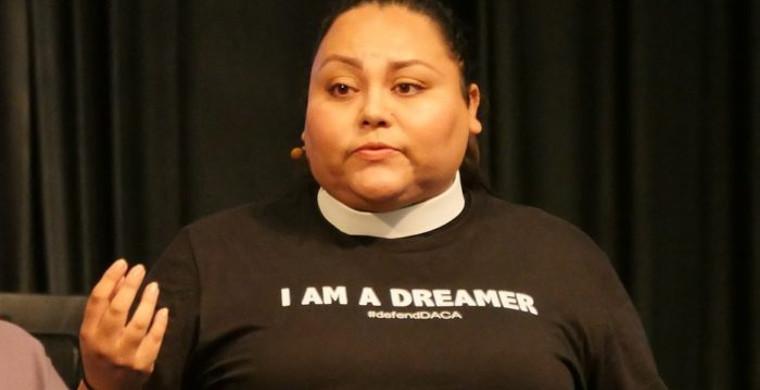Race, Immigration Take Center Stage at Episcopal General Convention
By Jeff Walton
https://juicyecumenism.com/
July 7, 2018
Social media and deputy chatter surrounding Episcopal General Convention this week has primarily focused upon proposed revisions to the Book of Common Prayer involving gender-neutral "inclusive" language and mandated access to same-sex wedding ceremonies in the minority of dioceses which do not currently permit them.
But planned events and presentations have instead focused around issues of race, immigration and the #MeToo movement.
On Sunday, a group from General Convention will bus to the T. Don Hutto Residential Center in nearby Taylor, Texas to conduct a worship service in front of the facility. The center, first opened in 2006, is used to detain non-U.S. citizens awaiting the outcome of their immigration status.
Some bishops have customarily taken part in protest actions during the General Convention. In 2009, bishops marched with hotel laborers outside Disneyland protesting a company program mandating payroll deductions for healthcare costs. In 2015, a group of more than 60 bishops participated in a march against gun violence, calling for restrictions on the purchase of firearms. There will also be an anti-gun event the morning of Sunday, July 8 at Brush Square Park across from the Austin Convention Center sponsored by Bishops United Against Gun Violence, a group of approximately 70 Episcopal bishops.
General Convention House of Deputies President Gay Clark Jennings highlighted immigration concerns during her opening remarks before the convention opening session on July 4.
"Especially on this day, I am grateful for our Presiding Bishop's faithful words about both the crisis of moral and political leadership currently gripping the United States and the crisis of migrants seeking asylum on the border right here in Texas," Jennings told the group. "We are commanded to love the stranger, even when doing so interrupts our comfortable relationship with temporal powers and principalities."
"We can't lose sight of the parents and children on the border who have been torn apart by our government," Jennings continued. "We can't lose sight of the fact that, due to a harsh state immigration law, those of us, like me, who have white privilege and the privilege conferred by United States citizenship can move around this place with less fear than some of our fellow Episcopalians."
Jennings advised that while debating immigration resolutions, deputies "need to be uncomfortable enough to remember that these are issues of life and death for many Episcopalians both in the United States and in the other countries that make up our church."
Presiding Bishop Michael Curry also noted the events in his July 5 opening sermon.
"When we go out to the Hutto Detention Center, meditate on the life and teachings of Jesus," Curry instructed. "When we join with Bishops United Against Gun Violence, meditate on the life and teachings of Jesus."
Racial issues were also central on the morning of July 6, when deputies participated in a two-hour joint session about racial reconciliation.
"We know that if there is no truth, there can be no forgiveness and no reconciliation" about racism, abuse of power or abuse of creation declared Bishop Suffragan Gayle Harris from the Diocese of Massachusetts. "We are about opening ourselves to transformation and God's grace."
Speaking at a press conference after the session, Harris lamented that despite coming from "the deep navy-blue state of Massachusetts" she "only needed one hand to count the number of people of color who have become rectors of predominantly white churches [in her diocese] in the past 100 years."
Asked about the Episcopal Church's status as a denomination that continues to be approximately 90 percent white despite selecting people of color for several high-profile leadership positions, Harris was circumspect.
"I think if we look at all religious bodies throughout the world, there are some issues of division," Harris assessed. "Certainly in the context of the Episcopal Church, we are no different than other Mainline Protestant churches. I don't think we suffer more than others, but we see the task as being great."
Harris did note that when she first arrived in her diocese, there was only one church with a significant Latino congregation, and now there are five. She credited this to churches being more willing to adapt to their changing neighborhoods.
"We need to welcome who is here on our doorstep into our churches," the Massachusetts bishop advised. "It's got to be on the micro level of interpersonal relationships."














